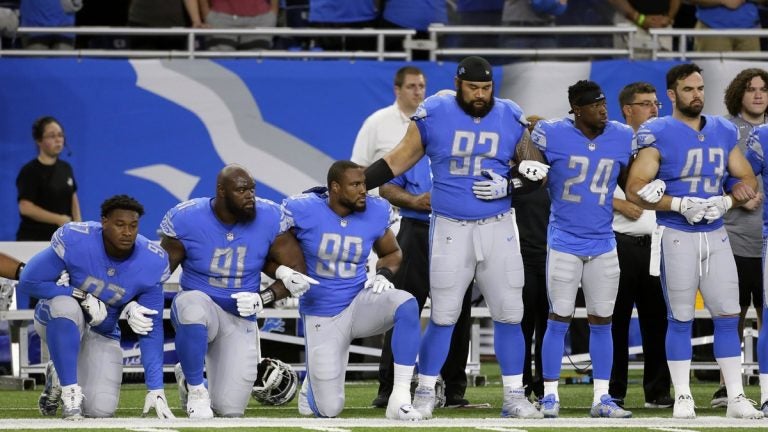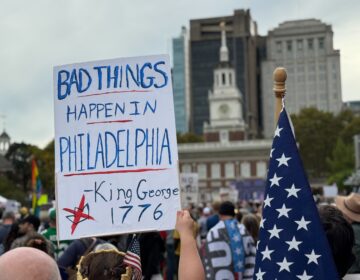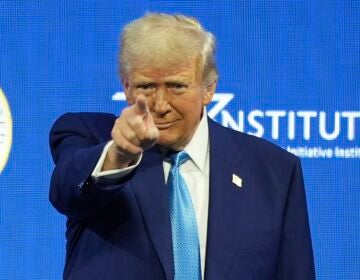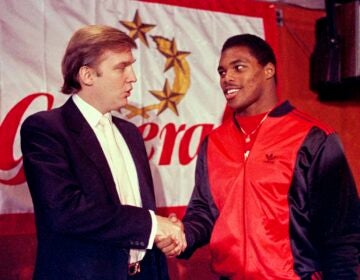Take a knee to protest Trump’s tinpot patriotism
Spewing anew without a clue, Trump presumed this weekend to tell us what is patriotism and what is not. Rest assured, the Founding Fathers shook their heads and took a knee.

Detroit Lions defensive end Armonty Bryant (97), defensive tackle A'Shawn Robinson (91), and defensive end Cornelius Washington (90) take a knee during the national anthem before an NFL football game against the Atlanta Falcons, Sunday, Sept. 24, 2017, in Detroit. (AP Photo/Duane Burleson)
Spewing anew without a clue, Trump presumed this weekend to tell us what is patriotism and what is not. Rest assured, the Founding Fathers shook their heads and took a knee.
Maybe he assailed the “son of a bitch” football dissidents merely to distract us from the fact that he achieves nothing of substance, or maybe he was blindly indulging his atavistic impulses, or maybe he was shrewdly calculating that his demagoguery (targeting black players, natch) would stroke the white base’s pleasure zone. Whatever. I don’t care what motivated him. What interests me most is his ignorance about what it truly means to be an American.
Or, to put it in more colloquial terms, this poseur doesn’t have the faintest idea what free speech and free expression are all about.
It’s bad enough that a guy who dodged the Vietnam War by pleading “bone spurs,” who says his “personal Vietnam” was waged by sleeping around and trying not to get the clap, somehow thinks he has the moral standing to lecture us on the meaning of patriotism. What’s worse is that we’re saddled with a “president” who doesn’t understand the First Amendment, who knows nothing about the broad parameters of expression mandated by the U.S. Supreme Court. Probably because he has never cracked a book or sought to school himself on things not covered by “Fox & Friends.”
When he tweets that NFL players who take a knee during the National Anthem are “disrespecting our Flag & Country” and should be summarily fired, he’s exposing his dangerous ignorance (again). At least three times in the last 74 years, the highest court in the land has clearly stated that it’s OK to express dissent — both passive (refusing to chant the Pledge of Allegiance) and overt (burning the flag) — even though most Americans might view those acts as unpatriotic.
It’s called freedom.
When the court ruled in 1943 that kids in class can’t be compelled to chant the Pledge if they don’t want to, the majority wrote: “If there is any fixed star in our constitutional constellation, it is that no official, high or petty, can prescribe what shall be orthodox in politics, nationalism, religion, or other matters of opinion, or force citizens to confess by word or act their faith therein.” When the court ruled in 1969 that people shouldn’t be punished for uttering words critical of the flag, the majority defended the “freedom to be intellectually diverse or even contrary” and the “right to differ as to things that touch of the heart of the existing order.”
Alas, those words are probably too fancy for a “president” who acts from the neck down, and we can surely assume that he’s similarly unfamiliar with the court’s 1989 ruling in Texas v. Johnson — when it defended a protestor who burned the flag at a Republican national convention. The majority didn’t want to rule in favor of a flag-burner, but that darned Constitution compelled them to do so. What they wrote applies as well to the 150 NFL players who protested in silence on Sunday:
“The Government may not prohibit the verbal or nonverbal expression of an idea merely because society finds the idea offensive or disagreeable … the Government may not permit designated symbols to be used to communicate a limited set of messages … the right to differ is the centerpiece of our First Amendment freedoms …
“[G]overnment cannot mandate by fiat a feeling of unity in its citizens. Therefore, that very same government cannot carve out a symbol of unity and prescribe a set of approved messages to be associated with that symbol when it cannot mandate the status or feeling the symbol purports to represent.”
The pivotal votes for the majority opinion were cast by two Republican appointees — one of whom was Antonin Scalia.
If Trump were to read those passages — following along with his finger and mouthing the words — he would theoretically be able to grasp their meaning. A president has no right to decree the firing of people engaged in passive protest during the National Anthem, because, as the court (including Scalia) said, “If there is a bedrock principle underlying the First Amendment, it is that the government may not prohibit the expression of an idea simply because society finds the idea itself offensive or disagreeable.”
But of course it’s futile to school a demagogue who’s bent on stoking the gut grievances of his minority base. It was a true patriot, Thomas Paine, who reputedly said: “To argue with a man who has renounced the use and authority of reason, and whose philosophy consists in holding humanity in contempt, is like administering medicine to the dead.”
WHYY is your source for fact-based, in-depth journalism and information. As a nonprofit organization, we rely on financial support from readers like you. Please give today.




